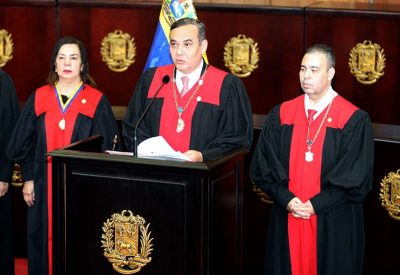Venezuela Rejects Washington’s ‘Wild West’ Bounty Against Chief Justice Moreno
The State Department has offered US $5 million for information leading to his capture.

Venezuela’s Foreign Ministry hit back at the Trump administration after it offered US $5 million for information leading to the arrest of Supreme Court President Maikel Moreno last week.
“The Venezuelan government once again rejects the Donald Trump administration’s illegal and coercive actions against the Venezuelan people…by way of false accusations and bounties in the style of cowboys and the Wild West,” Caracas said in a statement.
“The US people… deserve institutions dedicated to resolving the serious problems in society, including the justice system, such as determining the truth and perpetrators… in the Epstein case,” the statement continued, referring to notorious paedophile Jeffrey Epstein and his high-profile establishment connections.
The Foreign Ministry also pledged to include the move as additional evidence in its case before the International Criminal Court, in which Caracas argues that Washington’s sanctions constitute “crimes against humanity.”
Last week, the US State Department accused Moreno of “participating in transnational organized crime” and of “personally receiv[ing] money or property as bribery payments to influence the outcome of civil and criminal cases in Venezuela.” Moreno has categorically dismissed the allegations as “unfounded.”
The bounty is the latest in a series of similar compensations offered for the arrest of high-profile Venezuelan officials, including US $15 million for President Nicolas Maduro and US $10 million for other important figures, including National Constituent Assembly President Diosdado Cabello and Oil Minister Tareck El Aissami. All three men, alongside Moreno, were indicted by US federal prosecutors in March.
Moreno, who took over as Supreme Court president in 2017, was blacklisted by the US and Canada the same year, alongside dozens of other top officials, including President Maduro. The top judge was likewise sanctioned by Switzerland, Panama and the European Union in 2018.
Since declaring Venezuela an “unusual and extraordinary threat” to US national security in 2015, Washington has targeted scores of senior Venezuelan officials, freezing their foreign assets and imposing travel bans. Beginning in 2017, the Trump administration levied crippling financial sanctions, which it later escalated into an oil embargo and sweeping ban on dealings with Venezuelan state entities, enforced via secondary sanctions against third parties.
*
Note to readers: please click the share buttons above or below. Forward this article to your email lists. Crosspost on your blog site, internet forums. etc.
Featured image: Venezuela’s chief justice Maikel Moreno, who now has a US $5 million bounty on his head, addresses the Supreme Court. (@MaikelMorenoTSJ / Twitter)

